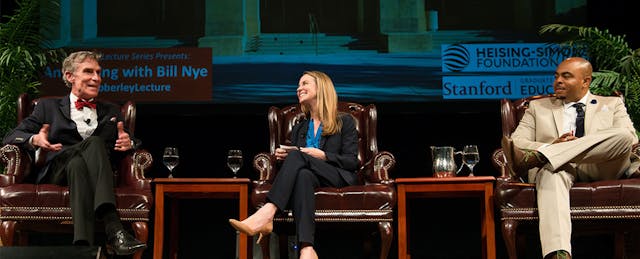When it comes to STEM (science, technology, engineering, math), Bill Nye the Science Guy is always open to the next big hypothesis—but he’s not easily sold on the newest gadgets and gizmos.
“Every time I come to San Francisco, I see these posters for tech companies in the airport, and I think, not every technology is going to be disruptive,” he said at a May 5 lecture he gave as part of the Stanford Graduate School of Education’s Cubberley Lecture Series.
However, the science guru, known for his popular 90’s children’s show, did include a caveat: just because products aren’t “disruptive” doesn’t make them any less valuable. “Don't pressure yourself to always have amazing new things. Incremental advances are good.”
Bill is no stranger to disruption, himself—but not exactly when it comes to technology. For the last few years, Nye has been traveling the country engaging in heated climate change and global warming debates, and more recently, promoting his newest book, “Unstoppable: Harnessing Science to Change the World.”
Co-written by Cory S. Powell, Unstoppable takes readers inside the use of science to improve and solve issues facing the environment and human existence. At the foundation of this environmental call-to-arms is Nye’s highlighting of a bigger, more systemic issue: the state of science education in the United States, which Nye says is in need of some restructuring.
"In science education or environmental education, you can't get discouraged or give up," he said during his Cubberley Lecture, emphasizing the importance of balancing project-based and experiential learning ("In science education, you have to show then tell”) with memorization ("It takes repetition, and after a while, people get it”).
During his lecture, Nye also stressed that bringing more girls and women into the sciences, specifically, doubles the number of people who can tackle environmental issues. He dove into this issue in Unstoppable, as well as his desire for worldwide access to internet, demonstrated by the following excerpt from his book.
“Let's give all the people of the Next Great Generation the chance to change the world. That's the practical aspect of diligent effort worldwide to provide educational opportunity for girls and women.
This is also another question of fairness here. It is just plain wrong to exclude girls from opportunity. And wait, there's one more enormous thing. Educated women have fewer babies. This is a universal demographic trend. The kids they do raise have more resources; they are wanted and loved. They have have an opportunity to thrive. If we embrace this idea and support education for everyone worldwide, the human population will stabilize and eventually, sustainably decrease. Having fewer humans here in, say, 2115 will put a lighter load on Earth's ecosystems.
This is all doable. We just have to decide it's worth doing and support education for everyone everywhere. That long journey can start with the single step of connecting everyone on Earth to the Internet. If everyone everywhere had access to the world's information, and learned the critical thinking skills needed to access and sort that information, we would change the world quickly.”
This “doable” attitude underscored much of what Nye discussed during his lecture, reminding listeners that “to change the world, you have to believe you can, and be optimistic."
Nye also continuously used the phrase “joy of discovery” to describe what he really felt science education is missing. The first step to recovering that joy? When it comes to teaching and learning science, don’t step away from the complex, Nye stresses. "When people say dumb it down, it just makes me crazy — or crazier. You don't want to dumb it down. You want to empower," he said. "You want everybody to feel that joy of discovery."
And, perhaps, it doesn’t hurt to play the Bill Nye theme song in class every once in awhile.


